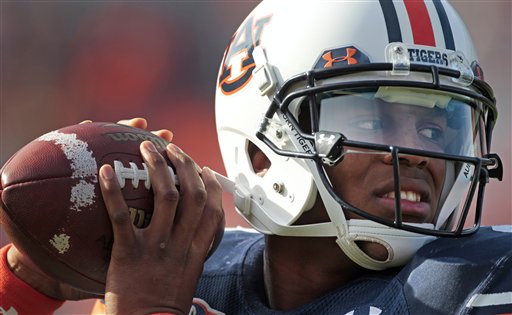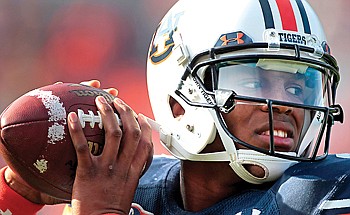 This Nov. 13, 2010, file photo shows Auburn quarterback Cam Newton warming up prior to an NCAA college football game against Georgia at Jordan-Hare Stadium in Auburn, Ala. Newton's status _ and his prodigious talent _ remains the primary topic surrounding No. 2 Auburn leading to the Iron Bowl against No. 9 Alabama. (AP Photo/Dave Martin, File)
This Nov. 13, 2010, file photo shows Auburn quarterback Cam Newton warming up prior to an NCAA college football game against Georgia at Jordan-Hare Stadium in Auburn, Ala. Newton's status _ and his prodigious talent _ remains the primary topic surrounding No. 2 Auburn leading to the Iron Bowl against No. 9 Alabama. (AP Photo/Dave Martin, File)Boy, that was quick. Auburn declared quarterback Cam Newton ineligible on Tuesday, though conveniently forgot to mention it to the media. The NCAA then reinstated Newton on Wednesday and couldn't wait to tell everybody.
Who oversaw this appeal? Olympic sprinter Usain Bolt?
E-mail takes longer than this. Heck, the NCAA normally makes eligibility rulings in months, if not years. Then again, it's not every day that the entire landscape of the Bowl Championship Series might hang one player's eligibility.
So college athletics' governing body explained this odd ruling over an exceedingly odd case with the following words: "...Under this threshold, the student-athlete has not participated while ineligible."
Duh. At what point did Newton have a chance to participate while ineligible? Had new Auburn basketball coach Tony Barbee made good on his desire to lure Newton onto the hoops Tigers in time for Tuesday night's victory over Georgia Southwestern?
(By the way, did any of you even know there was a Georgia Southwestern?)
No, something stinks about this and it has nothing to do with the ruling, which is certainly the correct one if neither Newton nor his idiot father ever received so much as a single penny to play for the Tigers, Mississippi State or anyone else.
For starters, this could set an interesting precedent for the future. Especially since both Auburn and the NCAA agree that Cecil Newton broke NCAA rules by shopping (some say pimping) his son to State, though there is no evidence of money or other goods changing hands.
But just imagine the next time anyone accuses a school of paying for an athlete. The school simply says that its athlete has absolutely no knowledge of this, that he never received a cent and that the NCAA better come up with some pretty strong proof that someone closely connected to him did if it intends to penalize it.
Of course, this is how the NCAA should probably have always worked, but it's not necessarily how it's conducted business in the past.
Just ask new Southern Cal athletic director Pat Haden, who's expected to meet the NCAA's Committee on Appeals in February.
While it is wrong for Haden to link former USC star and 2005 Heisman Trophy winner Reggie Bush's issues to those of Newton _ Bush's family was proven to have received thousands of dollars in illegal benefits while nothing, nada, zip has stuck to Newton _ he did make one strong point on Wednesday.
"I was always told the parent is the child," said Haden, who didn't take over the Trojans program until the NCAA had flattened USC early last summer. "If the parent does something inappropriate the child suffers the consequences."
Clearly, Cecil Newton did something inappropriate in shopping/pimping his son to State for as much as $180,000. And just as soliciting a prostitute is a crime _ whether a physical act takes place or not _ Papa Newton's action was supposed to be an NCAA violation.
But now the NCAA seems to be saying that if no money changed hands and Cam really knew nothing about it, well, where there's no harm there's no foul.
Or as NCAA vice president for academic and membership affairs Kevin Lennon noted: "In determining how a violation impacts a student-athlete's eligibility, we must consider the young person's responsibility."
You can bet that defense attorneys for past NCAA offenders are salivating like rabid dogs over that line.
Yet if nothing happened, why was Newton ruled ineligible in the first place? And if this was nothing more than a technicality, why handle it this way? Why not merely issue a statement that the NCAA has decided that Cam Newton is eligible until proven otherwise based on current information? Case closed. At least temporarily.
No, on some level this is about protecting this weekend's SEC Championship Game between Auburn and South Carolina, as well as next month's BCS title game, should the Tigers defeat the Gamecocks.
To have no NCAA ruling was to create too much of a circus around the likely Heisman winner, his team and the monumental games they would participate in.
So now he's eligible. Apparently sometimes where there's smoke there's only smoke.
Unless it's a smokescreen.
E-mail Mark Wiedmer at mwiedmer@timesfreepress.com
